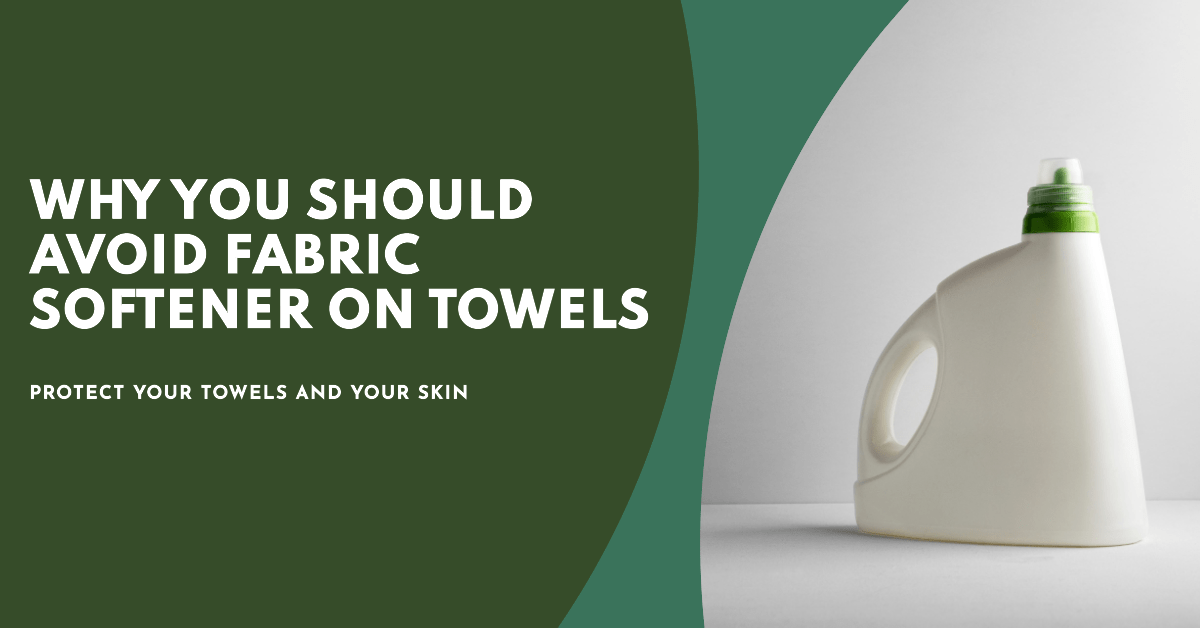Using fabric softener on towels is a common practice for many people who want super soft, fluffy towels straight out of the dryer. However, some experts suggest not using fabric softeners on towels because they may have drawbacks.
In this article, we’ll explore the advantages and disadvantages of using fabric softener on towels to help you decide if it’s a good choice for your towels.
What is a Fabric Softener?
Fabric softener is a liquid added to the wash cycle or dryer cycle to make fabrics feel softer. It works by coating the fabric fibers with a thin layer of chemicals that make the towels feel smoother and fluffier.

The main ingredients in most fabric softeners include:
- Water – Makes up 65-90% of most fabric softeners.
- Active Ingredients – Such as cationic polymers, fatty alcohols, and amphoteric surfactants that provide softness and reduce static.
- Fragrance Compounds – give towels a fresh, clean scent.
- Preservatives – Prevent bacteria and fungus growth to extend shelf life.
- Dyes/pigments – add color to the product, like blue dye.
- Hydrotropes – help maintain the stability of the product.
Benefits of Using Fabric Softener on Towels
There are a few advantages that come with using fabric softener on towels:
Enhanced Softness
The main benefit is that fabric softener coats the towel fibers to make them feel smoother, softer, and fluffier. Towels feel less scratchy or rough against the skin when treated with fabric softener.
Fresh Scent
Most fabric softeners contain perfumes and fragrances that give towels a clean, fresh smell after washing. This leaves towels smelling pleasant right out of the dryer.

Reduced Static Cling
The cationic surfactants in fabric softeners help to minimize static cling. This prevents towels from sticking together and makes them less likely to cling to your skin when you dry off.
Drawbacks of Using Fabric Softener on Towels
However, there are some potential downsides associated with using fabric softeners on towels:
Decreased Absorbency
One of the biggest issues is that the coating left by fabric softeners can make towels less absorbent. This means it takes longer for the towel to soak up water, making it less effective at drying your skin after a shower or bath.
Residue Build-Up Over Time
When you use fabric softeners a lot, they can leave a buildup on your towels. This makes towels feel hard and rough over time.
Fibers Break Down Faster
Some experts believe the chemicals in fabric softeners may break down cotton fibers more quickly over time. This shortens the lifespan of your towels.
Skin Irritation
Some people find the perfumes and chemicals in fabric softeners irritate their skin. The residues left on towels can cause rashes for sensitive skin.
Alternatives to Fabric Softener for Towels
To keep your towels soft and absorbent, you can use some natural alternatives instead of fabric softeners:
White Vinegar
A natural alternative for fabric softeners is white vinegar. It can effectively remove mineral build-up from towels. Just add 1/2 cup of white vinegar during the rinse cycle, and your towels will be softer without losing their absorbency.

Baking Soda
Baking soda is a handy item you probably have at home, and it can make your towels smell better and feel softer. Just mix some baking soda with water to create a paste, then rub it on your towels to get rid of stains. Don’t forget to rinse them well afterward.

Dryer Balls
Wool dryer balls help separate towel fibers and make them softer without chemicals. They also reduce drying time.
Conclusion
While using a small amount of fabric softener occasionally won’t necessarily harm towels, it’s best to avoid using it regularly. Instead, go for natural options like white vinegar and baking soda to keep your towels soft, absorbent, and without any residue buildup.
Focus on washing them in cold water and drying them thoroughly to maintain their plushness. With some simple laundry tips, you can enjoy cozy towels that are naturally soft against your skin.
Frequently Asked Questions
Can using fabric softener on towels cause skin irritation?
Yes, some people may experience skin irritation due to the perfumes and chemicals present in fabric softeners. The residues left on towels can lead to rashes, especially for individuals with sensitive skin.
Do fabric softeners affect the absorbency of towels?
Yes, using fabric softeners on towels can decrease their absorbency. The chemicals in fabric softeners leave a layer on the towel that can prevent it from soaking up water well. As a result, the towel may not work as effectively in drying your skin after a shower or bath.
Are there alternatives to fabric softener?
Yes, there are natural alternatives to fabric softeners. White vinegar, baking soda, and wool dryer balls can be used to keep towels soft and absorbent without the potential drawbacks.
Can fabric softeners contribute to the breakdown of towel fibers?
Some experts believe that the chemicals in fabric softeners may break down cotton fibers more quickly over time, potentially shortening the lifespan of towels. This suggests that regular use of fabric softeners might contribute to the breakdown of towel fibers.

